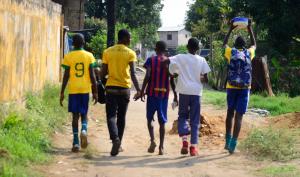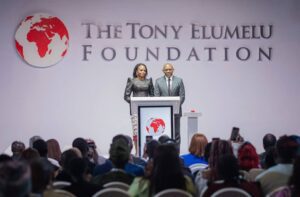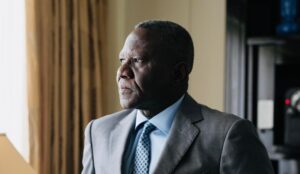
Source: Ghanaija
In the heart of West Africa, nestled between the bustling markets and tranquil landscapes, lies a small village named Tabi. The village is known for its vibrant traditions, lively festivals, and close-knit community. Despite the outwardly joyful atmosphere, the people of Tabi have long struggled with mental health issues, often masked by cultural stigma and a lack of understanding.
One day, a young woman named Amina, who had recently returned from her studies in Accra, decided to address the mental health challenges her community faced. Amina, armed with knowledge and a deep sense of purpose, organized a health fair aimed at raising awareness about mental health and promoting healthier lifestyles.
Amina’s journey began with a series of workshops conducted in collaboration with local health professionals and international organizations. The fair featured various booths, each focusing on different aspects of mental health and wellness. In one booth, Dr. Kofi Mensah, a psychiatrist from Kumasi, offered insights into common mental health disorders such as depression and anxiety, emphasizing the importance of seeking professional help.
Dr. Mensah’s presence was crucial, as he bridged the gap between medical knowledge and the local understanding of mental health. He used simple language and relatable examples to explain how mental health issues could affect anyone, regardless of age or background. His approachable demeanor made him a favorite among the villagers, who were eager to learn more about how to improve their mental well-being.
In another booth, Clara Ncube, a psychologist from Harare, Zimbabwe, introduced the concept of mindfulness and its benefits for mental health. Clara, known for her engaging and interactive sessions, led group exercises that helped participants understand how mindfulness could reduce stress and improve overall mental clarity. Her workshop was particularly impactful for the youth of Tabi, who often faced pressures from school and family expectations.
The fair also included sessions on physical health, as Amina recognized the interconnectedness between physical and mental well-being. John Mwangi, a fitness coach from Nairobi, Kenya, conducted exercise sessions that showcased how regular physical activity could enhance mood and reduce symptoms of depression. His energetic approach and positive attitude inspired many villagers to incorporate exercise into their daily routines.
Local traditional healers were also invited to the fair, acknowledging the cultural significance of their practices. Elder Abena, a respected healer from the nearby town of Koforidua, shared her wisdom on traditional methods of maintaining mental health. While she emphasized the value of cultural practices, she also encouraged openness to modern mental health strategies, creating a balanced approach that resonated with the community.
Amina’s initiative extended beyond the health fair. She established a support group for individuals dealing with mental health challenges, providing a safe space for them to share their experiences and seek guidance. The support group quickly gained traction, with members finding solace in knowing they were not alone in their struggles.
The impact of Amina’s efforts spread to neighboring villages, including Yendi and Sekondi, where similar health fairs were organized. Each village adapted the concept to their unique cultural context, incorporating local traditions and practices into the mental health awareness campaigns. These events not only educated people about mental health but also fostered a sense of community and mutual support.
In Yendi, for instance, a local artist named Nana Kwaku used his paintings to depict the emotional experiences associated with mental health issues. His artwork became a powerful tool for opening conversations and reducing stigma. The visual representations allowed villagers to express and understand their feelings in a way that words alone could not.
Sekondi took a different approach, focusing on mental health in the workplace. Amina partnered with local business leaders to implement wellness programs that addressed the psychological well-being of employees. These programs included stress management workshops and flexible working arrangements, which were well-received by both employers and employees.
As the movement grew, the government took notice. Recognizing the importance of mental health awareness, the Ministry of Health launched a nationwide campaign to promote mental health and support grassroots initiatives. This campaign included educational materials, mental health hotlines, and funding for local mental health projects.
In rural areas, such as the Maasai Mara in Kenya, where access to mental health services was limited, mobile clinics were introduced. These clinics, staffed by mental health professionals, traveled to remote communities, offering counseling and support to those who otherwise would not have had access. The initiative proved to be a lifeline for many, bridging the gap between urban and rural mental health care.
Through these efforts, a cultural shift began to take place. Mental health awareness became more integrated into daily life, and the stigma surrounding mental health issues started to diminish. People from all walks of life began to prioritize their mental well-being, recognizing it as a fundamental aspect of their overall health.
Amina’s vision had sparked a broader movement, one that continued to grow and evolve. The focus on mental health awareness and healthier lifestyles had a ripple effect across the continent, inspiring other regions to undertake similar initiatives. By embracing both traditional practices and modern approaches, Africa began to create a more inclusive and supportive environment for mental health.
In the end, the story of Tabi and its surrounding villages serves as a testament to the power of community and the importance of addressing mental health. Through education, collaboration, and compassion, Africa is gradually paving the way for healthier and more fulfilling lives for its people, one village at a time.








